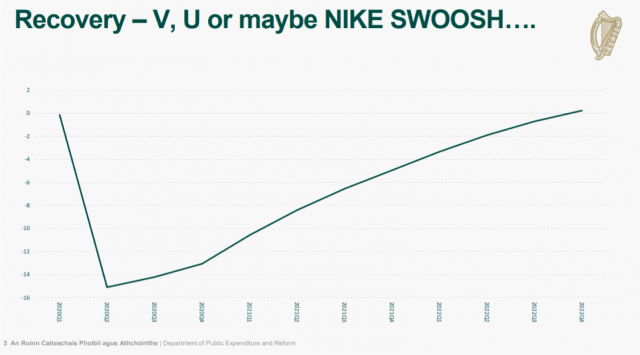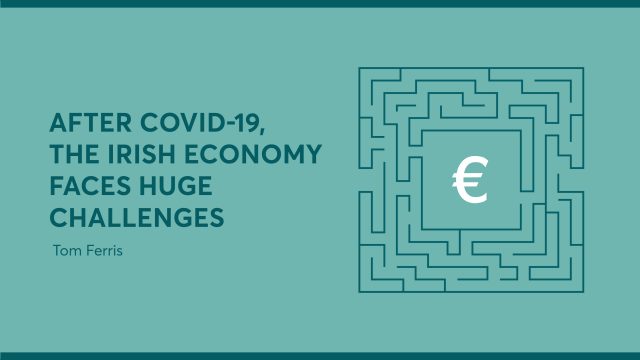After COVID-19, the Irish Economy faces huge challenges
Author: Tom Ferris
Introduction
COVID-19 is having a dramatic impact on Ireland. The Government’s response has been quick, with the introduction of a range of measures in the health, jobs and business sectors. The emphasis has been to protect the health and safety of people from the spread of the virus. The next big challenge will be to design public policies to manage the reopening of the economy after the virus has been contained. The World Bank in its recent economic outlook points out that that will be a difficult task - “Because the economic fallout is acute in specific sectors, policymakers will need to implement substantial targeted fiscal, monetary, and financial market measures to support affected households and businesses domestically”.[i]
Impact of COVID-19
The impact of COVID-19 on the Irish economy has been widespread. Business closures and lay-offs have taken place right across the country. The retail, hospitality and construction sectors have been particularly badly affected. In this regard, the recent Central Bank Quarterly points out of these sectors – “...where close to 650,000 people are employed, the number of job losses could exceed 500,000 during the current quarter” and “...the combined rate of unemployment may rise to around 25 per cent in coming months”.[ii]
Economic Response to COVID-19
The Government’s responses on the economic front are worth noting. Table I summarises the income supports that have been introduced. It is estimated that these new measures will cost approximately €3.7 billion over the 12 week period. In addition to income supports, the Government has announced a wide range of measures to support business. These include Financial Supports, deferral of Business Rates, Taxation Measures to alleviate short-term difficulties and Banking and Credit measures.
Table 1: Summary of Income Supports in response to COVID-19
- a temporary wage subsidy off 70% of take home pay up to a maximum weekly tax free amount of €410 per week to help affected companies keep paying their employees. This is the equivalent of €500 per week before tax
- workers who have lost their jobs due to the crisis will receive an enhanced emergency COVID-19 Pandemic Unemployment Payment of €350 per week (an increase from €203)
- the COVID-19 illness payment will also be increased to €350 per week
- the self-employed will be eligible for the COVID-19 Pandemic Unemployment Payment of €350 directly from the Department of Employment Affairs and Social Protection (rather than the Revenue scheme)
- enhanced protections for people facing difficulties with their mortgages, rent or utility bills
Source: Department of Public Expenditure and Reform
These economic measures are having a very significant negative impact on the Exchequer. However, they are necessary to provide support to workers, their families, and companies at this time of great economic and social stress.
Paschal Donohoe TD, Minister for Finance & Public Expenditure and Reform, has pointed out that – “The State will be able to fund these measures, but it will generate additional debt which will need to be paid off in the future”.[iii] The additional borrowing will take place hopefully against a backdrop of a strong improvement in Ireland’s debt position in recent years.
Reopening for business
The big question is when can Ireland reopen for business? The short answer is nobody knows. It depends on the containment of the spread of the virus, both at home and abroad. Two letters of the alphabet are being used to suggest the rate of recovery, namely the letter ‘V’ and the letter ‘U’. Using the former letter, the suggestion is that there will be a V-shaped recovery, where the economy suffers a sharp but brief period of decline; followed by an equally rapid bounce back. That seems very optimistic. By contrast, the letter ‘U’ suggests a somewhat slower pace of recovery and one that is not very strong. In addressing an IIEA group meeting on 22 April 2020, Robert Watt, Secretary General of the Department of Public Expenditure and Reform, described a third possibility, called ‘Nike Swoosh’ which suggests a longer and slower recovery. Graph 1 reproduces this possible recovery leading up to the last quarter of the year 2022.
Graph 1

If the re-opening of the Irish economy happens at this end of this year, it will coincide with the full impact of Brexit. There have been calls for the UK Government to do the “responsible thing” and extend the Brexit transition period, as coronavirus plays havoc with the timetable for an EU-UK deal. There are no suggestions that such calls on the UK Government are being headed. The potential negative impacts of a ‘double whammy’ were referred to in the Department of Finance’s recent ‘Draft Stability Programme Update 2020’. It pointed out that – “...the interplay between a prolonged pandemic induced recession and a possible UK exit without a future partnership agreement in place would have severe implications for the Irish economy and public finances”.[iv]
Challenges in Re-opening the Economy
The lockdown for COVID-19 cannot be lifted in one fell swoop. This will pose a range of challenges for Government. It is clear that Government will have to start by phasing-out the income supports and other sectoral supports that were introduced during the lockdown. At the same time, it will have to consider what supports and initiatives are needed:
- to support companies, as they restart their businesses, and
- to stimulate investment in areas like housing and infrastructure.
The cost of COVID-19 to the Exchequer also has to be managed. It is already considerable and will increase further. A recent estimate puts it as high as €30 billion or almost 10% of GDP. However, Donal de Buitléir, in a recent policy paper, concludes that – “...the costs of the additional borrowing necessitated by the crisis are affordable. Notwithstanding this, it is desirable that additional borrowing has extended maturity dates and that the funds are spent in a targeted and efficient way”.[v]
The challenges facing businesses are also considerable, particularly if a vaccine for COVID-19 is not found in the immediate future. The hospitality sector has been particularly badly affected and there is a real risk that many businesses in that sector may never reopen. In the case of pubs, there is a real risk that many businesses in that sector may never reopen. In the case of pubs, the Licensed Vintners’ Association (LVA) and the Vintners’ Federation of Ireland (VFI) have written to the Government accepting their invitation to discuss the Government Roadmap of 1 May 2020 and its implications for pubs as a matter of urgency. As part of their discussions with the Government, the two organisations will be pressing for pubs to reopen at the same time and on the same basis as cafes and restaurants. Recognising the challenge of maintaining social distancing in a hospitality environment, the organisations will also be putting forward radical changes to the normal operations of bars in order to protect public health.[vi]
Shadows also hang-over the aviation industry and the hotel sector.
The Irish Hotel Federation recently pointed out that – “Over the past few weeks, the industry has been decimated with over 85% of hotels closed and the majority of the 260,000 employees laid off or on short-time”.[vii] Accordingly, the Federation is calling on the Government to introduce a series of urgent measures to mitigate the impact of Covid-19 on the economy, including the tourism and hospitality industry.
As regards aviation, Ingrid Cherfis, President of the European Civil Aviation Conference (ECAC) recently highlighted the fact that – “Europe, like the rest of the world, is at a complete standstill with almost no traffic except for cargo, repatriation and medical flights. The entire aviation system is deeply impacted by the crisis with layoffs and unemployment increasing day by day”.[viii]
Conclusion
In addressing an IIEA group meeting on 22 April 2020, Robert Watt, Secretary General of the Department of Public Expenditure and Reform, referred to a range of public policy responses that will have to be planned for the recovery of the Irish Economy after Covid-19. He mentioned, in particular, the unwinding of the current emergency measures; the need to avoid pro-cyclical responses when it comes to fiscal policy and the policy responses required in areas such the labour market, public housing and infrastructure. Clearly there is not very much good news emanating from Covid-19. However, the fact that the economy is much sounder than when it was coming out of the Fiscal Crisis does give some consolation and reason for hope.
Tom Ferris is a member of the IIEA’s Economists Group. This is an updated version of his article published by LINKLINE, Chartered Institute of Logistics and Transport Ireland, April 2020.
The views expressed in this blog are those of the author, and not the IIEA.
[i] International Monetary Fund (IMF), World Economic Outlook, April 2020: https://www.imf.org/en/Publications/WEO/Issues/2020/04/14/weo-april-2020?utm_medium=email&utm_source=govdelivery
[ii] Central Bank of Ireland, Quarterly Bulletin 02, April 2020: https://www.centralbank.ie/docs/default-source/publications/quarterly-bulletins/qb-archive/2020/quarterly-bulletin---q2-2020.pdf?sfvrsn=8
[iii] Paschal Donohoe TD, Minister for Finance & Public Expenditure and Reform, Press Release on COVID-19, 24 March 2020: https://www.gov.ie/en/news/eaad55-government-announces-new-covid-19-income-support-scheme/
[iv] Department of Finance, Draft Stability Programme Update 2020, 21 April 2020: https://www.gov.ie/en/publication/43a6dd-stability-programme-update-2020/
[v] Donal de Buitléir, Can We Afford the Costs of the Covid-19 Crisis?, PublicPolicy.ie, April 2020: www.publicpolicy.ie
[vi] Licensed Vintners Association and Vintners’ Federation of Ireland, Press Release, May 2020: http://lva.ie
[vii] Irish Hotel Federation, COVID-19 | Hoteliers Call for Urgent Supports to Save Irish Tourism and 260,000 Jobs: www.ihf.ie
[viii] European Civil Aviation Conference, Interview with Ingrid Cherfis, President of ECAC, April 2020: https://www.ecac-ceac.org/news

